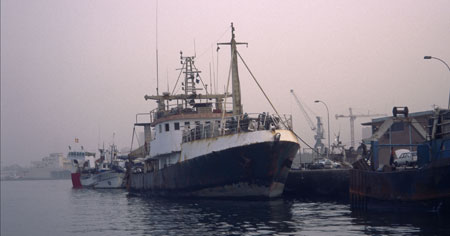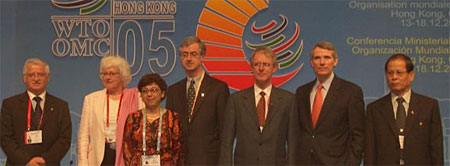Purpose
- Investigates causes tending to destroy or impair the free-market system.
- Explores and develops market-based solutions.
Summary
World Wildlife Fund (WWF) actively worked with private sector partners in our pursuit of new disciplines on fisheries subsidies, including the United States’ most important seafood trade organization, the National Fisheries Institute. We also aligned our work with parallel efforts by a group of governments that favor new, more trade-friendly rules in this area.
Description
Citizens and taxpayers are increasingly aware that the Earth’s oceans are being dangerously overfished. What many people do not realize, however, is that their tax dollars are being spent in ways that make the overfishing crisis worse, and simultaneously distort international markets. The fact is that governments around the world are pouring billions into misguided subsidies to their national fishing industries—subsidies that often directly encourage overfishing.
 Dakar, Senegal. European trawlers at Dakar Harbour, Senegal.
Dakar, Senegal. European trawlers at Dakar Harbour, Senegal.
© WWF-Canon / Jo BENN
WWF has long been the leading non-governmental advocate for eliminating subsidies that drive overfishing and overcapacity. At the center of this work is its effort to achieve binding new international rules under the auspices of the World Trade Organization (WTO) which ban the subsidies most closely associated with overfishing and discipline the rest.
 Ministers Stand Together for Healthy Fisheries at the WTO
At a critical World Trade Organization ministerial meeting (Hong Kong, December 2005), ministers from seven countries gathered to call for new WTO rules on subsidies that drive overfishing. Pictured are (from left) Jos Ritsch, (Brazil), Marian Fischer (EC), Monique Barbut (UNEP), Jim Leape (WWF), Jim Sutton (NZ), Robert Portman (US), and Domingo Panganiban (Philippines). Also participating in the event (but not pictured) were Ignacio Walker (Chile) and Mamadou Diop (Senegal).
Ministers Stand Together for Healthy Fisheries at the WTO
At a critical World Trade Organization ministerial meeting (Hong Kong, December 2005), ministers from seven countries gathered to call for new WTO rules on subsidies that drive overfishing. Pictured are (from left) Jos Ritsch, (Brazil), Marian Fischer (EC), Monique Barbut (UNEP), Jim Leape (WWF), Jim Sutton (NZ), Robert Portman (US), and Domingo Panganiban (Philippines). Also participating in the event (but not pictured) were Ignacio Walker (Chile) and Mamadou Diop (Senegal).
WWF’s early years of work on the issue helped put the problem of fisheries subsidies on the international political map and secure attention squarely on the WTO’s negotiating agenda. From the beginning, WWF’s steady campaigning and technical engagement were critical to the advancement of the WTO negotiations. WWF made significant progress in educating WTO members on the problems with fisheries subsidies; helped persuade the WTO to begin negotiating new fisheries subsidies rules; and helped encourage members to agree that new rules should ban subsidies that contribute to overfishing.
On July 24, 2006, the entire multilateral round of WTO talks was suspended due to an impasse between the United States and the European Union over agriculture subsidies. Despite the suspension, WWF remained focused on encouraging delegates to enact rules aimed at rationalizing the economics of fishing, creating a more level playing field for fisheries production, and ending the use of public funds to underwrite overfishing.
During the hiatus, WWF continued to work to advance important elements of its technical agenda related to sustainability criteria. The Chair of the fisheries subsidies negotiations, who remained surprisingly proactive on the issue during the break, continued to work on an informal basis to incorporate sustainability criteria into new fisheries subsidies rules. As part of this effort, the Chair initiated a dialogue between WTO delegations and representatives of the U.N. Food and Agriculture Organization (FAO) Secretariat, which emerged at that time as a critical component of the talks. This work not only advanced WWF’s advocacy efforts at the WTO, but helped posture its initiative to deal with the consequences of a possible collapse of the negotiations.
When the talks resumed in February 2007, albeit without a resolution of the major issues that had originally led to their suspension, WWF increased its advocacy on sustainability criteria and launched an intensive outreach effort aimed at the FAO. Most notably, in March 2007, WWF co-sponsored a two-day symposium with the United Nations Environment Programme (UNEP) entitled “Disciplining Fisheries Subsidies: Incorporating Sustainability at the WTO and Beyond” with UNEP’s Environment and Trade Bureau in Geneva, Switzerland. WWF also prepared a detailed background paper on the issue: “Sustainability Criteria for Fisheries Subsidies: Options for the WTO and Beyond” and made the paper available to symposium attendees.
Later that March, WWF participated in the bi-annual meeting of the FAO’s Committee on Fisheries (COFI) in Rome. WWF’s interventions and advocacy at COFI, along with the presence of many delegates who had just attended the WWF/UNEP symposium, helped produce a renewed mandate for positive FAO engagement in the WTO fisheries subsidies process. Shortly thereafter, the United States ended a two-year period of relatively passive involvement in the negotiations when it submitted a major negotiating proposal promoting several of the key solutions promoted by WWF, including a broad ban on the most harmful subsidies. The following September, WWF and UNEP released a significant technical paper on sustainability criteria for fisheries subsidies. All the while, WWF remained engaged with WTO delegates as they prepared informal negotiating proposals on sustainability criteria.
In November 2007, the WTO fisheries subsidies negotiations took a major step forward with the release of the first draft of proposed new rules by the chairman of the negotiations. Significantly, the “Chair’s Draft” embraced all of the basic elements regarding sustainability that WWF had advocated. WWF publicly welcomed the draft, and has since worked to both defend and strengthen it. In January 2008, WWF held another Geneva workshop, this time in collaboration with UNEP, ICTSD and Oceana to promote and reinforce the draft among WTO delegates.
The ultimate fate of the current round of WTO talks remains a matter of speculation and international concern. Spring 2008 is a critical period during which WTO members will determine whether the talks proceed at an intense pace or remain in limbo for several more years. Whatever the result, the fisheries subsidies negotiations have progressed significantly, and are now set to enter a period of high political debate that will determine whether governments have the political will to deliver on the promises they have made and agreed to in the Chair’s Draft.
Purpose
Our project promotes binding new international rules to eliminate harmful fisheries subsidies. Many existing fisheries subsidies tend to impair free trade by causing distortions in the economics of fisheries production. These distortions simultaneously upset competitive relationships and contribute to the erosion of an economically vital natural resource base. The elimination of harmful fisheries subsidies would remove economic incentives for enterprises to pursue unprofitable fishing, and thus would allow market forces to act as a critical feedback mechanism in regulating the level of global fishing effort.
Scope
Harmful fishing subsidies—mainly from developed countries—contribute significantly to fishing fleet overcapacity and overfishing. They are both trade distorting and environmentally destructive. Fishing subsidies prop up overlarge, inefficient, and otherwise uncompetitive fishing fleets and create impediments to sustainable and equitable trade in seafood products. They also exacerbate the adverse environmental effects of fishing by encouraging fleet overcapacity—one of the most serious problems in a world where outsized fleets have already fished 75% of the Earth’s fisheries up to their biological limits or beyond. Recent data suggests that subsidies worldwide total over US $15 billion per year. But most of these payments remain hidden from public view, and often encourage behavior that is inconsistent with rational fisheries management.
Since 1998, WWF has been working with governments, international organizations, and others to encourage the WTO to adopt binding new international rules on fishing subsidies, with a focus on eliminating those that contribute to overfishing. After years of public campaigning and quiet technical engagement by WWF, the WTO negotiations have reached the point where new fisheries subsidies rules are certain to be adopted. But the question now is whether such new WTO rules will be strong and effective.
The Walker Foundation grant provided essential resources needed to support WWF’s analytic and advocacy activities both at the global level—where WWF is a visible actor within the WTO system—and at the level of national governments and regional organizations. If governments can be persuaded to do their part, the result will be healthier fisheries and more sustainable trade.
In the United States, WWF’s work to eliminate harmful fisheries subsidies has enjoyed broad governmental and non-governmental support from the outset. The reality is that while the U.S. does provide some subsidies to its fishing industry, the scale of subsidization is a fraction of what is provided by governments in Japan and Europe. This is why the National Fisheries Institute—one of the leading U.S. fishing industry associations—has joined WWF in advocating for new WTO fisheries subsidies rules. Additionally, successive U.S. administrations, with bi-partisan support from leading members of Congress, have taken a visible leadership role in the fight for a WTO ban on subsidies that contribute to overfishing.
However, despite significant progress, some fisheries subsidies programs remain in need of reform. For example, a long-standing program known as the Capital Construction Fund provides a tax-deferred savings plan for fishermen seeking to make additional investments in their fishing vessels. The fund, which currently represents over $200 million dollars in tax-deferred income, dates from a time when U.S. policy was to encourage the expansion of the U.S. fishing fleet. Today, however, economic realities have made it less attractive (and less sustainable) for fishermen to increase the fishing capacity of their vessels. WWF has proposed legislation that would allow fishermen to make productive use of their CCF savings, without requiring them to build new or more powerful boats.
Information Dissemination
Key information is posted on our website:
Visit Website
WWF engaged weekly with key WTO delegations, distributed issue briefs to provide technical and political inputs, publish studies on relevant topics of a public-interest nature, hosted workshops and other public events to engage relevant delegations and stakeholders, and invited the press to cover all events to maximize pressure for a positive outcome. It will be possible to judge the visibility of WWF’s work through press reports and attendance reports from WWF-sponsored events, such as the press coverage of the release of WWF’s critique of the negotiations last June (for an “insider” story on how WWF’s publication influenced a negotiating session, see Bridges Trade Biores at http://www.ictsd.org/biores/06-06-30/story1.htm) and attendance at an informal workshop held for WTO delegates in Geneva.
Amount Approved$20,000.00
on 11/30/2005
(Check sent: 12/12/2005)